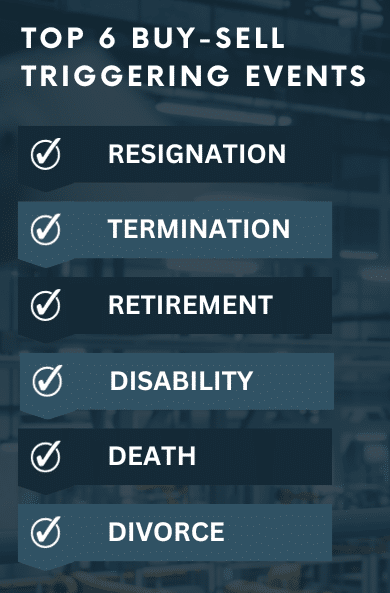If you’re concerned about preserving your company’s culture during unforeseen changes or emergencies, a buy-sell agreement could be your solution. Owners who have invested years into building a cohesive company culture and shared operational philosophy understand the importance of safeguarding this unity. This is where a buy-sell agreement comes into play.
“A buy-sell agreement can help you avoid unwanted or unqualified buyers who might disrupt the operations, culture, or vision of the business.” Advises Pinion consultant Travis Free. “Without such an agreement, you risk legal battles and conflicts among involved parties including spouses, outside family members, and even creditors.”
What is a buy-sell agreement?
Simply put, it is a formal contract company owners that ensures a smooth transition of ownership and business continuity in the face of a triggering event.
It’s a tool that that allows owners to specify the triggering events that would lead to a buyout, whether by the company, the other owners, or third parties. It outlines the share valuation method and payment terms for the buyout once a triggering event occurs. Additionally, it specifies who can purchase your stake, including as co-owners, key employees or external parties.
What is a triggering event?
A triggering event is a tangible or intangible occurrence, that, once met, set other actions in motion. Simply put, if event A occurs, it triggers event B. Most buy-sell agreements establish a foundational list of common triggering events, which can be remembered using the acronym QFRDDD (Quits, Fired, Retires, Disabled, Dies, or Divorced)
However, these are not the only triggering events available to business owners. For example, you could have a triggering event that occurs if an owner gets into legal trouble or a third-party offers to purchase the business.
What are the benefits to a buy-sell agreement?
“A buy-sell agreement is designed to help partners manage difficult situations while safeguarding the business and personal interests,” says Free. “Just as important, it shields the company from unwanted outside influences.”
The process to ensure that the buy-sell agreement is meeting the needs of the business and its owners is by determining the appropriate “triggering events” that will cause action to take place if met.
How a buy-sell agreement could benefit your company:
- Protects against outside influence. If a shareholder intends to sell their ownership, the agreement can grant the company or other owners the right of first refusal. This maintains internal control, ensuring that no outside influence is brought in. If an owner wants to go work with a competitor or start up their own competing business, you can stipulate that they must sell their shares back at an agreed upon discount.
- Establishes right-to-purchase. For businesses with owner-employees, the agreement can dictate that if an employee-owner is terminated, the company or remaining owners have the option to purchase their shares. Some agreements even stipulate valuation discounts if the termination is for specified events.
- Defines a clear path forward in transition. It clearly defines the manner and timing of an owner’s exit. For example, the agreement can address situations where a retiring employee-shareholder’s interests diverge from the corporations. Options could include allowing the retired employee-owner to sell their shares back or stipulate that the company is allowed to buy back the shares at anytime in the future.
What are the disadvantages of a buy-sell agreement?
Proper planning is crucial to avoid drawbacks associated with buy-sell agreements. These potential disadvantages include:
- Undervaluation: Owners may not accurately assess the business’s value, setting unrealistic buy-back prices.
- Outdates terms: Fixed prices established at the agreement’s outset can become outdates as businesses evolve. Regular updates are essential.
- Funding Challenges: If a triggering event occurs and funds are needed to buy back ownership, you want to make sure the company can handle that investment.
- Complexity: To prevent misinterpretation, agreements can become highly detailed and complex, requiring careful consideration.
What’s next?
“A buy-sell agreement can be a powerful tool to protect your business culture and legacy,” says Free. “Weigh the benefits and drawbacks of an agreement and consider factors specific to your business, such as ownership dynamics, your business growth and exit strategy and other potential risk factors.” Whether it’s a buy-sell agreement or another tool – you will never regret proper planning.
Contact a Pinion advisor to determine if a buy-sell agreement is right for your business or to get the process started.







